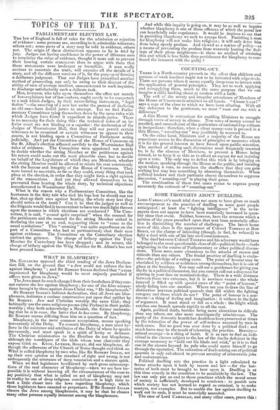COUNTING-OUT.
THERE is a North-country proverb to the effect that children and persons of weak intellect ought not to be intrusted with edge-tools. There are persons whom it seems equally dangerous to intrust with the application of general principles. They set to work applying and misapplying them, much to the same purpose that we can imagine a child hacking about at random with a knife.
The evil of the scanty and irregular attendance of Members of the House of Commons is admitted on all hands. " Count it out ! " says a sage of the class to which we have been alluding. With all due deference to the gentleman, we must " wear our rue with a difference."
A thin House is convenient for enabling Ministers to smuggle through votes of money in silence. Now votes of money cannot be recalled, and concealment of the particulars of national expenditure is inexpedient : therefore, when a silent money-vote is pressed in a thin House, " counting-out" may justifiably be resorted to. On the other hand, Ministers and a majority of the House are sometimes averse to the discussion of principles or measures which it is for the general interest to have forced upon public attention. The method of stifling such discussions most frequently resorted to, is by the absence of Members, to prevent a House being formed, or to keep it so thin as to afford an excuse for not insisting upon a vote. The only way to defeat this trick is by bringing on the motion, speaking through the House at the public, and insisting upon taking a vote, to convince the shuffiers that they can gain nothing but may lose something by absenting themselves. When political leaders and their partisans absent themselves to suppress discussion, " counting-out' is playing their game.
The combination of these two cases seems to express pretty accurately the rationale of " counting-out."


























 Previous page
Previous page